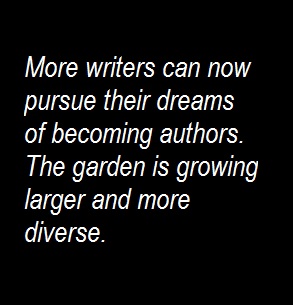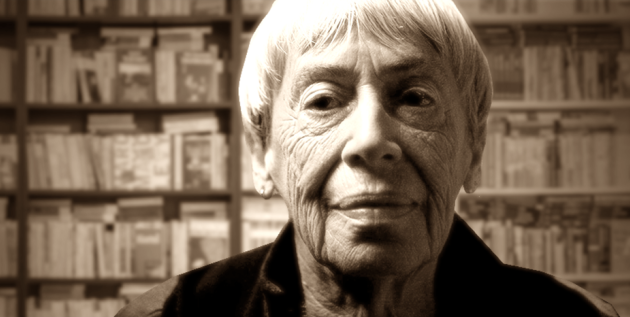Amazon Liberates Readers: The Digital Era Creates Gardens without Gardeners by Stewart Dompe
Science fiction author Ursula K. Le Guin thinks Amazon represents everything that’s wrong with capitalism:
If you want to sell cheap and fast, as Amazon does, you have to sell big. Books written to be best sellers can be written fast, sold cheap, dumped fast: the perfect commodity for growth capitalism.
The readability of many best sellers is much like the edibility of junk food. Agribusiness and the food packagers sell us sweetened fat to live on, so we come to think that’s what food is. Amazon uses the BS Machine to sell us sweetened fat to live on, so we begin to think that’s what literature is.
She blames the online retailer for perpetuating a system that encourages authors to produce “sweetened fat” instead of the literature that nourishes the soul. She attacks the marketing of best seller lists (“BS lists”), and it would not be a mistake to infer that she believes these lists are comprised of an entirely different sort of “BS.” She writes:
Best Seller lists are generated by obscure processes, which I consider (perhaps wrongly) to consist largely of smoke, mirrors, hokum, and the profit motive. How truly the lists of Best Sellers reflect popularity is questionable.
If the literary world is a garden, then Amazon would be a gardener whose liberal use of fertilizer, Le Guin contends, has encouraged the growth of weeds. But her anger is misplaced. There is no gardener — and the garden is more beautiful than ever.
Spontaneous Order in the Book World
Amazon is a consequence, not the cause, of the digital revolution. More books are being published every year because it is now easier to become an author. Traditional publishers printed 316,480 new titles in 2010. That’s 100,000 more than they published in 2002, but this figure is dwarfed by the 2.7 million “nontraditional” titles that were published in 2010. The importance of publishing houses, bookstores, and critics has eroded because authors can now bypass these middlemen and sell ebooks directly to the public. All it takes is a website and some social-media savvy.
 Some will argue that with this large increase in quantity, the weeds will start to outnumber the roses. The problem with this argument is that it misunderstands the market segmentation that is occurring. Simply put, what is a weed to one is a rose to another. Publishers need to sell a minimum number of books to recover the substantial fixed costs of printing. These financial pressures mean that even a well-written manuscript would be rejected if it were judged to appeal to too small an audience. As the cost of publishing has fallen, manuscripts that were previously rejected are now being published, and authors can now target smaller audiences. It is therefore unsurprising if readers find that most books conflict with their aesthetic preferences — they are not the intended audience.
Some will argue that with this large increase in quantity, the weeds will start to outnumber the roses. The problem with this argument is that it misunderstands the market segmentation that is occurring. Simply put, what is a weed to one is a rose to another. Publishers need to sell a minimum number of books to recover the substantial fixed costs of printing. These financial pressures mean that even a well-written manuscript would be rejected if it were judged to appeal to too small an audience. As the cost of publishing has fallen, manuscripts that were previously rejected are now being published, and authors can now target smaller audiences. It is therefore unsurprising if readers find that most books conflict with their aesthetic preferences — they are not the intended audience.
Abraham Lincoln, Vampire Hunter will never sit on my parents’ nightstand. That is neither a tragedy nor unexpected, but to the people who love historical horror fiction, the world is a better place with that book in it. More writers can now pursue their dreams of becoming authors. The garden is growing larger and more diverse.
What Hath Marketing Wrought?
Le Guin is concerned about the influence of marketing in creating best seller lists. But even with a much larger budget than what book publishers have, Hollywood seems incapable of ensuring against $100 million bombs like Tomorrowland. Producers may broadly know what “the people” want, but that knowledge offers little guidance in ensuring a commercial success.
If you had told me a few years ago that one of the most popular book series in America, the Twilight saga, would be about a love triangle between a mopey teenage girl, a werewolf, and a centuries-old pedophile, I would have laughed in your face. Another best seller, Fifty Shades of Grey, started as Twilight fan fiction. In what smoke-filled room was it decided to sell erotica at Walmart?
Best sellers are an interesting phenomenon, because book consumption — once an intimate connection between reader and writer — has transformed into a widely shared social experience. These shared experiences create bonds between strangers. Art is a bridge that connects otherwise lonely islands of experience. When Mark Zuckerberg announced his book club, he was inviting countless strangers to join him in thinking and talking about the world.
Producing a best seller is harder than it looks. What sells or doesn’t sell — and what becomes the next breakout hit — is never the outcome of design. Writers and publishers experiment. Readers respond. Social media allows the cycle to accelerate, and sometimes the results can seem bewildering.
In this new era, more people are dedicating their lives to creating art. It is hard to find fault with either those pursuing their dreams or those paying them to do so. There are more books than we can read in a lifetime. If there is anything to regret, it is our pitifully short lives, not the literary bounty before us.
Le Guin is a brilliant novelist, but she fundamentally misunderstands the nature of the 21st-century market. The challenge now facing all readers is not to criticize the abundance of choices but to develop better filters for finding the literature that appeals to their interests. Luckily, Amazon has some recommendations you may be interested in viewing.
Stewart Dompe is an instructor of economics at Johnson & Wales University. He has published articles in Econ Journal Watch and is a contributor to Homer Economicus: Using The Simpsons to Teach Economics.




Leave a Reply
Want to join the discussion?Feel free to contribute!